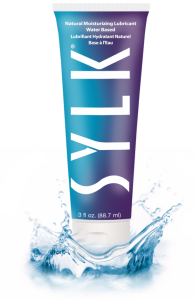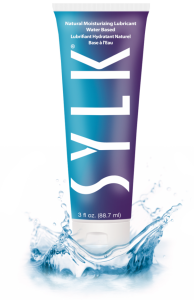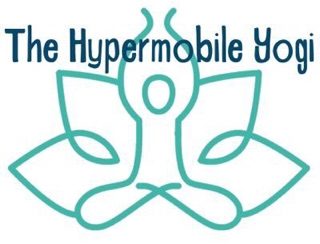“THIS IS A SPONSORED POST. I HAVE BEEN COMPENSATED THROUGH THE CHRONIC ILLNESS BLOGGERS NETWORK. ALL OPINIONS REMAIN MY OWN, AND I WAS IN NO WAY INFLUENCED BY THE COMPANY.”
Last week, I posted on Strength/Flexibility/Health/EDS about how you can be allergic to semen and how it relates to Mast Cell Activation Syndrome (MCAS) and Ehlers-Danlos syndrome (EDS); however, in this post I also discussed other chronic pelvic pain conditions that seem to “travel in packs” for those of us living with a chronic illness (or several). While the point of the article was to explain how this type of allergy is often overlooked, the symptoms it often presents with, and how it may be tied to an underlying route condition, the same “pack” of conditions and symptoms, often causes vaginal dryness as well.
 Vaginal dryness or any issues “down there” are less than fun to discuss or bring up, and most suffer in silence. Something as simple as using a personal lubricant can help not only make sex more comfortable and enjoyable, it can also ease daily symptoms as well. SYLK is the best all-natural product in the personal lubricant product category. The all-natural ingredients in SYLK can help reduce this dryness (whether or not sex is part of the equation).
Vaginal dryness or any issues “down there” are less than fun to discuss or bring up, and most suffer in silence. Something as simple as using a personal lubricant can help not only make sex more comfortable and enjoyable, it can also ease daily symptoms as well. SYLK is the best all-natural product in the personal lubricant product category. The all-natural ingredients in SYLK can help reduce this dryness (whether or not sex is part of the equation).
For those sensitive to chemicals and other additives commonly found in various foods and skin care products, SYLK is fragrance-free, has no chemical additives or preservatives, and is paraben-free.
What causes vaginal dryness?
“During menopause, estrogen production slows and then stops. When that happens, a number of changes — many of them unwelcome — happen in a woman’s body. Periods become irregular and then stop. You may have hot flashes, mood swings, a deeper voice, and an increase in facial hair.
Vaginal dryness is another common symptom of menopause — and close to one out of every three women experiences it while going through “the change.” And it becomes even more common after menopause. Vaginal dryness also can occur at any age from a number different of causes. It may seem like a minor irritation. But the lack of vaginal moisture can have a huge impact on your sex life. Fortunately, several treatments are available to relieve vaginal dryness.
Normally, the walls of the vagina stay lubricated with a thin layer of clear fluid. The hormone estrogen helps maintain that fluid and keeps the lining of the vagina healthy, thick, and elastic. During menopause, the drop in estrogen levels reduces the amount of moisture available. It also makes the vagina thinner and less elastic. This is called vaginal atrophy.
In addition to menopause, estrogen levels can drop from:
- Childbirth and breastfeeding
- Radiation or chemotherapy treatment for cancer
- Surgical removal of the ovaries
- Anti-estrogen medications used to treat uterine fibroids or endometriosis
- Other causes of vaginal dryness include:
- Sjögren’s syndrome (an autoimmune disorder that attacks cells in the body that produce moisture)
- Allergy and cold medications and certain antidepressants
- Douching
- Lack of enough foreplay before sexual intercourse
- No matter what the cause, vaginal dryness can be extremely uncomfortable. It can lead to itching, burning, and painful intercourse.”
Read more by going to http://www.webmd.com/women/guide/vaginal-dryness-causes-moisturizing-treatments#1
SYLK is the only lubricant made from New Zealand Kiwifruit Vine extract. This proprietary ingredient is filled with polysaccharides, which give the product its natural, film-like texture. SYLK is also a trusted product, sold for over 30 years internationally, and is now available in the United States as an FDA cleared product, because of its long-standing record of safety and effectiveness. SYLK has improved people’s lives from all walks of life.

For those with hypermobility or a type of Ehlers-Danlos syndrome, vaginal dryness and the discomfort that is associated with it, is often exacerbated by any damage to the fragile tissues in the vagina and external vaginal area. One of the best ways to help prevent tissue damage and enjoy sex safely is to use a personal lubricant. In fact, it’s nearly a requirement.
“EDS-associated gynecologic disorders Irregular menses, metrorrhagias, severe dysmenorrhea, dyspareunia, vulvodynia and vaginal dryness are frequent in EDS women [12,17-19]. Chronic pains represent the most common neurologic complaints [20]. They are commonly associated with joint hyperlaxity and dislocation. Involvement of the S2-S4 joints is responsible for the Alcock canal syndrome with pelvic pain worsened by sitting [21].”
To read more, go to http://www.hoajonline.com/gynecology/2052-6210/2/1
To learn more, go to SylkUSA. You can also visit SYLK’s facebook page – https://www.facebook.com/sylkusa, or find them on Twitter: @sylkusa, and Instagram: @usa.sylk.
 SYLK can be purchased through several online retailers such as Amazon.com – http://amzn.to/2cyuTHR.
SYLK can be purchased through several online retailers such as Amazon.com – http://amzn.to/2cyuTHR.
SYLK’s website – https://sylkusa.com/landing-learn-more/
Additional Resources:
EDS Info File on Ehlers-Danlos syndrome (EDS)
‘Obstetric and gynecologic dysfunction in the Ehlers-Danlos syndrome’ (1994)
‘5 Things that Cause Vaginal Dryness’
Mayo Clinic’s article on Vaginal Dryness
WebMed’s article on Vaginal Dryness, Causes & Treatment Options
Article originally posted on Strength/Flexibility/Health/EDS.com and reposted with permission.

